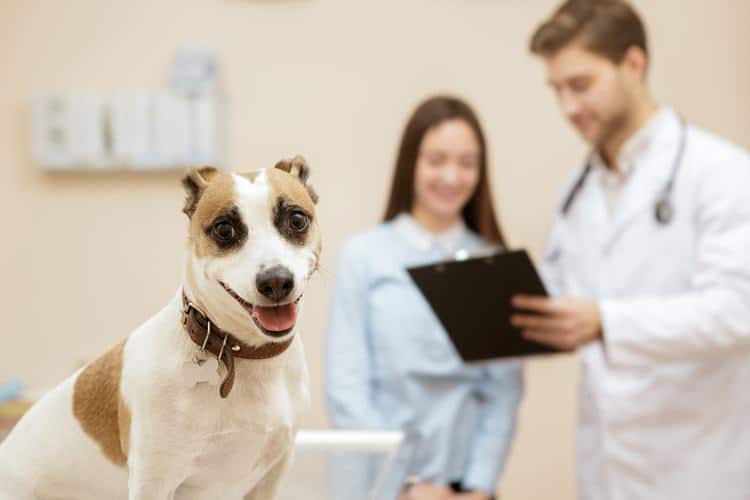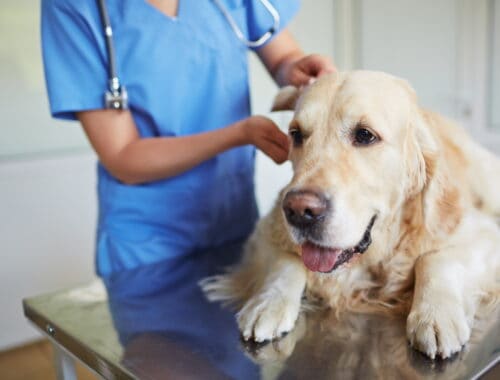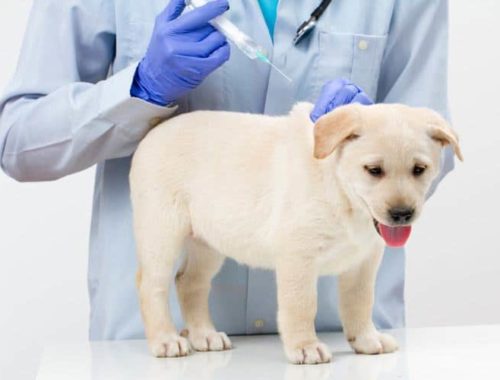Being proactive about preventative health is one of the best ways to ensure that your dog enjoys a long and happy life. But what questions should you be asking your veterinarian to ensure that you’re doing your part to keep your dog healthy and lower the risk of illness, disease, and injury? We’ve put together this list of the 10 most important questions you should ask your vet to arm you with the need-to-know information all dedicated dog owners should know.
1. Should my pet have tests for hidden diseases? What lab work do you recommend for my pet?
 Dr. Barry Neichin, Chief of Staff at ABC Veterinary Hospital in San Marcos, CA
Dr. Barry Neichin, Chief of Staff at ABC Veterinary Hospital in San Marcos, CA
Blood analysis is a vital tool for screening out disease. “Even pets that appear happy and healthy can have hidden medical problems that might grow serious, even life-threatening, if left undetected. Blood tests are essential for identifying diseases at the earliest most treatable stage possible.
“Pets can’t tell us when they’re ill – that’s where lab tests like blood analyses come in.
“Even in young and healthy pets, lab testing gives us a valuable baseline picture of what represents good health for your individual pet. A recommended part of your pet’s annual exam, blood tests can spot health trends sooner, before they become more serious.”
“Standard blood test panels for dogs and cats routinely check for many problems, commonly:
- Complete Blood Cell Count (CBC) provides important information about the types and number of blood cells in your pet’s blood. A low red blood cell count, for example, indicates anemia, while a high white blood cell count can indicate an infection, chronic inflammation or other disease process.
- Blood Chemistry Profile is particularly important for evaluating organ function (e.g., liver, kidneys), electrolytes, blood sugar, screening for presence of an endocrine disorder, etc. Any abnormalities will help us decide on further diagnostic tests or treatments.
- Heartworm Test can detect evidence of heartworm disease. For a more complete picture, we will often combine a blood panel with other tests, such as a urinalysis and fecal examination.”
Source: Importance of Annual Blood Tests for Pets
2. Which vaccines should my dog receive?

“Core vaccinations prevent diseases that are extremely widespread in their distribution and are easily transmitted. These diseases are commonly fatal or extremely difficult to treat effectively. One core disease—rabies, can be transmitted to humans with potentially deadly results. In summary, core diseases are the more contagious and severe diseases.
“Core vaccines provide long term immunity, making yearly vaccination unnecessary. Core vaccines include:
- Canine distemper
- Canine parvovirus
- Canine adenovirus 1 infection
- Rabies
“Historically, these vaccines were recommended yearly but this is no longer the case. Duration of immunity from these vaccines has been proven to be at least 3 years. Rabies vaccines are sometimes administered more often based on state and provincial regulations. While not all vaccines carry a label that indicates they are effective for 3 years, current recommendations for core vaccines are that after the completion of an initial series, dogs should be revaccinated every 3 years.
“Non-core vaccines protect against diseases that do not meet the core vaccine description. While all dogs are at risk for core diseases and must be vaccinated–risk of exposure, likelihood of infection, and severity of disease should be evaluated when making non-core vaccine recommendations. The indication for these vaccines should be based on a risk assessment that looks at local and regional incidence of the disease. The risk assessment should also take lifestyle into consideration. Non-core vaccinations may include:
- Leptospirosis
- Lyme disease
- Canine cough complex
- Canine influenza
“These vaccines generally provide a shorter length of protective immunity, and dogs that are at risk for infection should be vaccinated every year.”
Source: What Vaccinations Does My Adult Dog Need?
3. How often should I schedule examinations?

“Annual examinations (or at least twice-yearly for some pets) are the cornerstone of a good preventive care regimen, and preventive care is critical for your pet’s health. You may even save money when you can work with your veterinarian to tweak your pet’s care in order to prevent health problems from occurring (changing his diet, for example, to help prevent or reverse obesity), or to catch and treat illness earlier – hopefully before it can adversely impact your pet’s quality of life. The approval of another year’s worth of heartworm medication, as well as a review of all other medications, is part of that process.
“I know many people accept the need for that first heartworm test, but balk at subsequent ones. They argue that they’ve given the medications as prescribed and their pets should be heartworm-free. Problem is, we’re only human. Studies shows that about a quarter of all pets don’t get all their heartworm doses, leaving room for infestation. Your veterinarian needs to make sure your pet isn’t carrying these parasites despite your best intentions. That means you’ll need to take him in for a heartworm test at regular intervals.”
Source: Does My Dog Really Need a Yearly Vet Visit?
4. What is the ideal weight for my dog?

“The ideal weight for a pet can depend on the breed and size of the individual pet. The best way to judge if your dog is at his ideal weight is to use body condition score. Our State of Pet Health Report describes the body condition score and shows you how to perform this.”
Source: How do I know if my dog and cat are at ideal weights?
5. What is considered adequate and appropriate exercise for my dog?

“Dr. Susan Nelson, K-State veterinarian and assistant professor of clinical sciences, said dogs, like people, reap many benefits from exercise. She said there are physical and mental health advantages for the dog owner and the dog when they exercise together.
“Nelson said exercise is important, but dogs differ in the amount and types of exercise they should be doing to maintain good health. A blanket recommendation for exercise time amounts can’t be given as exercise needs vary vastly between individuals, and factors such as age, breed, weather and general health all influence the amounts of exercise your dog will need. Nelson said to consider these guidelines:
- In general, larger and working dogs have higher energy needs, and smaller/toy breeds need less exercise.
- Ideally, dogs should get out twice daily for exercise. Times may vary from 15-60 minutes, depending on your individual pet.
- Turning the dog loose in the backyard isn’t enough — aerobic exercise should be continuous with few breaks. Most dogs are content to lie in the sun and only get up for short periods of activity. If the dog has another dog it can run around with outside, that could be sufficient if they spend long periods of continuous play, but don’t rely upon that in most circumstances.
“Nelson said there are many generalities when it comes to exercising with dogs, but they are just generalities. For example, though many small dogs prefer lighter activities, Jack Russell terriers tend to be very high-energy pets. Here are some generalities for activities to do with your dog depending on its needs and interests:
“Medium and large dogs typically make better long-distance running partners. If your dog can run longer than you are able, you may want to consider biking while having your dog run beside you on leash. Pay careful attention to safety if you choose this option. Smaller dogs are better suited for shorter distance running or walking.”
Source: Vet Says Owners Should Exercise With Their Dogs Based On Specific Needs To Prevent Obesity
6. What diet should I feed my dog, and how often should he be fed?

“Dogs, like us, are advanced mammals. Their physiology and biochemistry is no less complex than ours. And that means that, at this time, nobody knows what is the ideal diet for a dog.
“That doesn’t mean there aren’t plenty of people who think they know what is ideal. And goodness knows some of them like to make noise on the Internet. Some of these folks espouse theories that seem logical and sensible. But they’re not yet proven.
“Some of the major pet food manufacturers have research facilities where they have fed dogs nothing but their brand of commercial food for many generations. These groups of dogs are alive, well, and healthy with no nutritional deficits. This is taken to mean that the diets are complete and balanced.
“And indeed, from a scientific standpoint, it is hard to refute the claim that a diet fed exclusively to many generations of dogs must be complete and balanced. But that doesn’t mean it’s ideal. There almost certainly could be some way to make the diets better.
“How about the folks who advocate grain-free or raw diets? They often claim that such diets are more species appropriate, since wild canids usually limit their grain intake to that which is found in the gastrointestinal tracts of their prey. In theory, this makes sense. But the theory’s not proven, and it also neglects the fact that dogs are no longer wild canids. They co-evolved with humans, and as we started eating grain, no doubt so did they. (Developing countries currently offer a pretty good idea of what the canine ancestral environment looked like, and in those places dogs eat human leftovers and refuse. In those places, dogs eat what humans eat.)
“My body, like all human bodies, can thrive on a diversity of diets. I have no idea what the ideal diet is, but so far in my life, as long as I have consumed food in moderation and engaged in plenty of exercise, I have not suffered from any nutritionally mediated problems.
“Canine bodies are equally versatile. I know an awful lot of healthy dogs. I know dogs who are thriving and in perfect health on commercial diets. I know dogs who are thriving and in perfect health on grain-free or raw diets. I know dogs who are thriving and in perfect health on homemade diets.
“Is one of these diets the ideal one? Is there even such a thing as an ideal diet? Despite all of the hype and the noise, nobody knows. Nothing is proven.
“However, in the next 15 years or so we may learn a great deal about this subject. The currently running, massive lifetime Golden Retriever study will be monitoring the health of a huge group of dogs fed different diets. By the end of the study we may know which diet is ideal, or we may learn that there is no such thing as an ideal diet. Or, let’s face it, we may simply learn that we don’t know much at all.”
Source: Ask a Vet: Is There an Ideal Diet for Dogs?
7. Are there supplements or natural remedies that would help my dog?

“The pet supplement industry brings in over a billion dollars a year, so clearly lots of people think so! A better question is, ‘should I give my dog supplements?’ The answer to that depends on what you want to give, and why. Here are some of the most commonly used supplements:
“Joint and arthritis support
“One of the most popular categories in pet supplements is joint support, and with good reason. Glucosamine and chondroitin sulfate are widely used in both human and veterinary medicine, and are well accepted in the medical community as a safe and effective complement to more traditional medications. I often recommend these for senior pets, particularly larger breed dogs who are often prone to joint disease.
“Skin support
“EFA (essential fatty acid) supplementation is a mainstay in many veterinary dermatology offices, for its anti-inflammatory properties and for its ability to strengthen the skin’s function as a barrier. Fish based fatty acids have a more optimal ration of omega-6 to omega-3 fatty acids than vegetarian based EFAs such as flaxseed.
“Gut support
“Got a flatulent dog or one who always seems to be suffering from midnight bouts of diarrhea? Probiotics, intended to flood the GI tract with ‘good’ bacteria, are often helpful for mild cases of GI upset.
“Liver support
“A healthy pet should not need a liver support supplement, but in dogs with specific liver conditions, milk thistle or SAM-e can help reduce inflammation and improve liver function. Veterinary-specific formulations exist and are my go-to for dogs that would benefit from them.
“Vitamins
“Commercial dog diets are formulated to meet very specific nutritional guidelines, meaning they have all the critical vitamins and minerals your dog needs. The only time I usually recommend them is if you are feeding a home-cooked diet or other diet that needs those additional supplementations. When in doubt, ask your vet.”
Source: Can I give my dog supplements?
8. Should I purchase pet insurance?

“Every day, I handle any number of routine visits to my office. I spay and neuter animals, clean teeth, administer vaccines and heartworm medication, distribute flea products, and even address behavioral problems. All of which costs money — and none of which is covered by most pet-insurance policies. That said, I also routinely refer cases to specialists for treatments that can run thousands of dollars. At such times, insurance can seem like a godsend.
“Buying insurance, after all, means placing a bet that disaster will someday strike. And like any seasoned gambler, you should spend some time assessing the odds. First, consider how much a policy will really cost you in the long term. A basic plan for a young dog runs about $50 a month. The average life span for, say, a Labrador retriever is 10 to 12 years, so you’d be looking at an annual cost of $600 — or $6,000 to $7,200 over the estimated lifetime of that lab. (The smaller the dog, the longer his life span, so adjust accordingly for a teacup poodle or Great Dane.)
“It’s also worth taking a good, hard look at yourself. Are you the type of owner who would pursue all possible avenues to save a beloved pet — radiation for an ailing bulldog, perhaps, or knee surgery for a 10-year-old Labrador? If so, insurance might make more sense for you than for the person likely to forgo treatments that seem overly invasive or heroic.
“Finally, determine exactly what your pet insurance policy will cover. Most plans have a $50 deductible per visit and pay roughly 90 percent of all covered costs. This usually excludes routine procedures, like rabies shots, and hereditary matters, including common ailments like hip dysplasia in bigger dogs. But insurance does cover large, unexpected catastrophes, such as a pet who has been struck by a car or an aging animal who requires treatment for cancer.
“Still unsure? Have your veterinarian look at the policy you’re considering to get a professional opinion on the odds of your pet’s having a disorder or accident that’s covered.
“For the record: In my practice of more than 4,500 client files, I can find only one insured dog.”
Source: Is Pet Insurance Worth It?
9. How do I prevent dental disease? What do you recommend for dental care?

“In my veterinary clinical practice, I am very passionate about my patients having healthy and clean mouths. Periodontal disease and obesity are the two most common diseases I diagnose. While both conditions are entirely preventable, the negative consequences associated with each are often irreversible.
“My own dog, Cardiff, has Immune Mediated Hemolytic Anemia (IMHA), a typically fatal condition potentially caused by excessive immunostimulation from inflammation and infection. My goal is for Cardiff to never experience another hemolytic episode, so I’ve established a daily routine to minimize bacterial accumulation in his mouth. I alternate between using a toothbrush (often a Sonicare) and cleaning with a circular fabric swab impregnated with an antiseptic called Sodium Hexametaphosphate (SHMP).
“How did I establish this method of daily oral cleansing for Cardiff? I sought guidance from an expert in the field of veterinary dentistry (and included my perspective based on practicality and independently researched effectivity) from Anson Tsugawa VMD, DACVD, of the Dog and Cat Dentist, who provided his Top Three Tips for Pet Dental Care.
1. Dental Cleaning
“When having your pet’s teeth professionally cleaned, expect more than merely a simple process akin to a tooth version of a car wash and detail. While under anesthesia for the cleaning, request dental radiographs (X-rays). Without the addition of this important oral diagnostic test, the veterinary professional will be unable to assess the bone level around the teeth; an important criteria in determining a tooth’s periodontal disease status and what treatment beyond cleaning is necessary (e.g., periodontal surgery or extractions).
“’Furthermore, in cats, dental radiographs are important in screening for a painful disease known as tooth resorption; a condition for which all adult cats should be evaluated.’
2. Tooth Brushing
“Tooth brushing, ideally, should be performed daily. We recommend using a traditional flat profile toothbrush, and if a paste (dentifrice) is used, choose a veterinary product. Human tooth paste contains fluoride and foaming agents that may be toxic or upsetting to your pet’s gastrointestinal tract if ingested.
“It is not necessary to use a paste, although the flavoring (e.g., poultry, beef, etc.) may be helpful in encouraging good behavior when brushing. That said, many people find that their dog/cat chews on the brush in an attempt to eat the paste, and that it is more distracting than helpful.
“Therefore, using a water-moistened brush and simply offering a small amount of paste as a treat after brushing may ultimately be a better approach. Regarding brushing technique, we recommend directing the bristles of the brush at a 45-degree angle. The tips of the bristles should be angled toward the gum-line and a horizontal motion should be used. Strive for efficiency by brushing sets of teeth (for example, all six incisors as one set, canines and premolars as another set, etc.).
“Lastly, avoid simply rushing up to your pet and ripping open the mouth to brush. Instead, gently lift your pet’s lip and introduce the brush head into the mouth.’
3. Dental Treats
“Treats such as hard plastic bones, sterilized real bones, ice cubes, cow hooves, antlers, and bully sticks are too hard for your pet and may cause tooth fractures. Dental treats that have received the Registered Seal by the Veterinary Oral Health Council (VOHC) are recommended.
“The VOHC is an organization that exists to recognize products that meet preset standards of plaque and tartar/calculus retardation in dogs and cats. Products are awarded the VOHC Seal of Acceptance following a review of data from trials conducted according to VOHC protocols. Submission of results of clinical trials to the VOHC on behalf of a product is voluntary. VOHC is an excellent resource for dental diets, treats, water additives, gels, toothpastes and tooth coatings that help retard plaque and tartar on the teeth of animals.”
Source: Top Three Tips for Pet Dental Care from a Veterinary Dental Specialist
10. What flea and tick treatments and heartworm treatments do you recommend?

“Heartworm Treatment: Personally, I really love ProHeart. This is an injectable heartworm prevention for dogs that lasts for six months with a single shot. From what I understand, outside of the US it is frequently used at a higher dose and lasts for a full year. I wish we had that here! I love this prevention because you only have to worry about it twice a year. It’s so easy for people to forget a monthly pill, and this keeps that from happening. Veterinarians can include this in their preventative care reminders, easily contacting clients when another dose is due. This is the preventative I give to my own dogs.
“If ProHeart wasn’t available, I would use Trifexis. I think this is a very safe product, despite the unwarranted media and internet hype about it. I like the fact that it covers heartworms, fleas, hookworms, roundworms, and whipworms. It’s the only product on the market to do all of that (Sentinel doesn’t count….it prevents flea eggs from hatching but doesn’t actually kill adult fleas…and it has the same heartworm preventative found in Trifexis!).
“There are a plethora of monthly pills similar to Heartgard. Iverhart, Tri-Heart, and several others use the exact same combination of ivermectin and pyrantel to protect against heartworms, roundworms, and hookworms. All of them are equally effective, only differing in cost and brand name. There is nothing wrong with any of them, and they are still an important staple of heartworm prevention.
“Flea & Tick Prevention: There are many more choices in this category, and it can get very overwhelming. Do a search on my blog for ‘fleas’ and you will get lots of details that I’ve written over the years on proper flea control. This time I’m focusing on specific products. But PLEASE read some of my other posts, as no product will be 100% effective, and there are many, many things that can lead to a persistent flea problem even if the product is working well.
“As I mentioned above, I’m a big fan of Trifexis. In my case, since I’m using ProHeart for heartworms, I use other products to control fleas and ticks. I really like Comfortis, which is the same flea control ingredient found in Trifexis. Dermatology specialists tend to like this product for dogs allergic to fleas since it kills so fast and so thoroughly. The only downside to Comfortis is that it doesn’t do anything for ticks (neither does Trifexis). If your dog really doesn’t go near places with ticks, this is an excellent choice. If you worry about ticks as well, I’d recommend something else.
“My favorite topical products are Advantage (fleas only), K9 Advantix (fleas and ticks), and Vectra 3D (fleas and ticks…sold under the brand name FirstShield Trio in the Banfield Pet Hospital chain, but is the same product). Currently, I’m using Vectra on my dogs, but I think that the Bayer products work as well and am happy to recommend them to clients. Advantage has been shown to be safe in most small animals, so it can actually be used on rabbits, ferrets, and guinea pigs (though this is “off-label” and not officially approved for these species). The products combined with heartworm prevention (Advantage Multi and Revolution) are just as effective against fleas as the non-heartworm equivalents.”
Source: Recommendations For Flea, Tick, And Heartworm Prevention…..2015 Update
On your next vet visit, be sure to ask your vet these 10 important questions so that you can work together to keep your dog happy and healthy for many years to come.
































